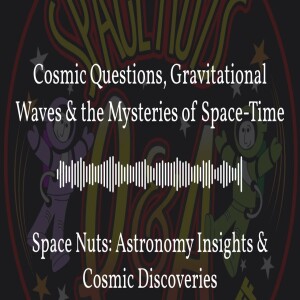
Monday Apr 21, 2025
Cosmic Questions, Gravitational Waves & the Mysteries of Space-Time | Space Nuts: Astronomy...
This episode is brought to you with the support of NordVPN, the official VPN service of the Space Nuts team. We use it and you should too. To get our special deal of up to 74% off and 4 months extra for free, just visit www.nordvpn.com/spacenuts (https://www.nordvpn.com/spacenuts)
In this thought-provoking episode of Space Nuts, host Heidi Campo takes the reins while Andrew Dunkley enjoys a well-deserved holiday. Joined by the ever-insightful Professor Fred Watson, they dive into a range of captivating questions submitted by listeners. From the potential discovery of habitable exoplanets within our lifetime to the mysteries of gravitational waves and the intriguing concept of the cosmic jerk, this episode is a treasure trove of astronomical knowledge and cosmic wonder.
Episode Highlights:
- Habitable Exoplanets: Heidi and Fred discuss a question from Thomas, a year 11 student, about the likelihood of finding a habitable planet during our lifetime. Fred shares insights on the thousands of exoplanets already discovered and the promising candidates that may support life.
- Gravitational Waves and LIGO: Adriano from Italy poses an intriguing question about how LIGO measures gravitational waves from colliding black holes. Fred explains the mechanics behind these measurements and explores the potential to detect gravitational waves from the early universe.
- The Moon's Shifting Position: Anthony from Sydney wonders why the moon appears to shift so dramatically in the sky. Fred clarifies the geometry behind the moon's orbit and its relationship to the sun, providing a fascinating perspective on lunar observations.
- Space Tearing and the Big Rip: Mikey from Illinois asks if space can tear and what that would look like. Fred discusses the theoretical notion of "space tearing," the Big Rip hypothesis, and the extreme conditions required for such an event to occur.
- The Cosmic Jerk: Greg from Minnesota raises a question about the acceleration of the universe and whether it is changing at a constant rate. Fred elaborates on recent findings from the Dark Energy Survey Instrument and the implications for our understanding of cosmic expansion.
For more Space Nuts, including our continually updating newsfeed and to listen to all our episodes, visit our website. (https://www.spacenutspodcast.com/) Follow us on social media at SpaceNutsPod on Facebook, X, YouTube Music Music, Tumblr, Instagram, and TikTok. We love engaging with our community, so be sure to drop us a message or comment on your favorite platform.
If you’d like to help support Space Nuts and join our growing family of insiders for commercial-free episodes and more, visit spacenutspodcast.com/about (https://www.spacenutspodcast.com/about)
Stay curious, keep looking up, and join us next time for more stellar insights and cosmic wonders. Until then, clear skies and happy stargazing.
(00:00) Welcome to Space Nuts with Heidi Campo and Fred Watson
(01:10) Discussion on the potential for habitable exoplanets
(10:50) How LIGO measures gravitational waves from black holes
(20:30) The shifting position of the moon in the sky
(28:15) Exploring the concept of space tearing and the Big Rip
(35:20) The cosmic jerk and the acceleration of the universe
For commercial-free versions of Space Nuts, join us on Patreon, Supercast, Apple Podcasts, or become a supporter here: https://www.spreaker.com/podcast/space-nuts-astronomy-insights-cosmic-discoveries--2631155/support (https://www.spreaker.com/podcast/space-nuts-astronomy-insights-cosmic-discoveries--2631155/support?utm_source=rss&utm_medium=rss&utm_campaign=rss) .
Episode link: https://play.headliner.app/episode/26706399?utm_source=youtube
No comments yet. Be the first to say something!